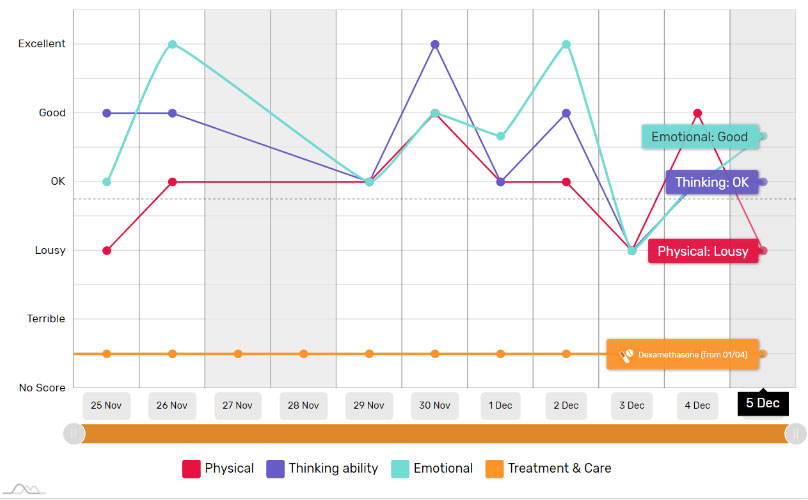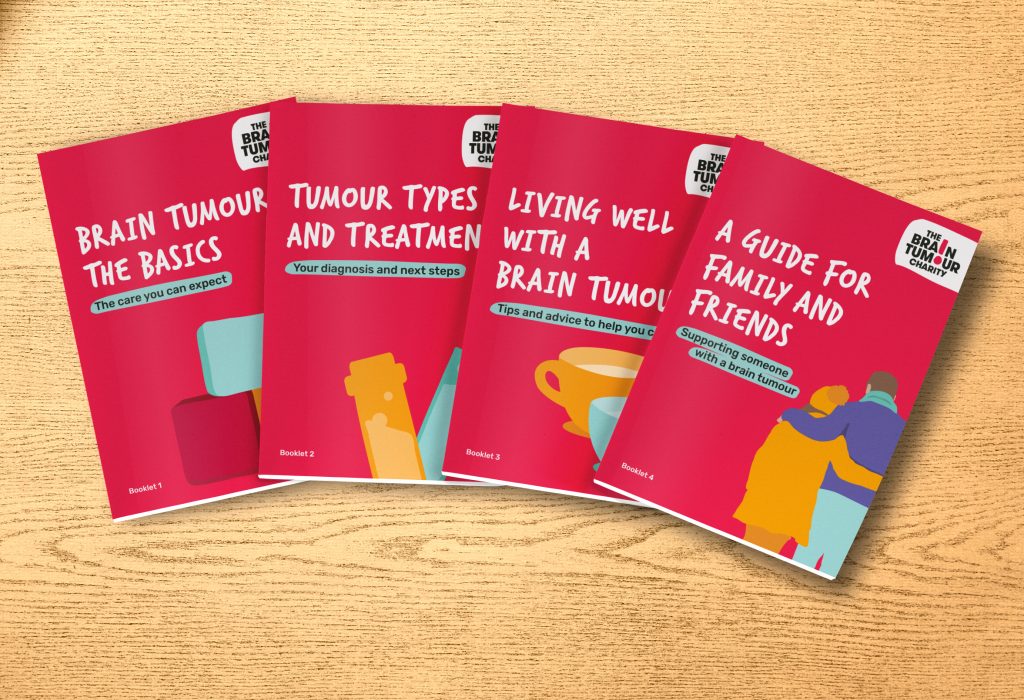Astrocytoma
An astrocytoma is a brain tumour that grows from astrocyte brain cells. About 1/3 of brain tumours diagnosed in the UK are astrocytomas, making them the most common primary brain tumours. These tumours affect adults and children and are often treated by neurosurgery followed by radiotherapy and sometimes chemotherapy.
If you or someone you know has just been diagnosed with a brain tumour, you may be in a state of shock. It’s natural to feel this way, and we understand. That’s why our Support Team is here to answer any questions you may have or provide a listening ear if you need one.
On this page, we’ll cover:
- What is an astrocytoma?
- What are the astrocytoma symptoms?
- Astrocytoma treatment
- What causes astrocytomas?
- How long can I live with an astrocytoma?
Get support
It’s normal to feel shocked if you or someone you know has been diagnosed with an astrocytoma. Our Support Team can answer questions you have or provide a listening ear if you need one.
Get your free Information Pack
Our Brain Tumour Information Pack can help you better understand your diagnosis and feel confident talking to your medical team.
Get the BRIAN app
BRIAN is our trusted online app where you can track your experience, compare it with others who’ve been there and get the knowledge you need to make informed decisions.
What is an astrocytoma?
Astrocytoma (pronounced ass-tro-sigh-toe-ma) is the most common type of primary brain tumour and is part of a larger group of brain tumours called gliomas.
They grow from a type of cell in the brain called an astrocyte. These cells support and protect the nerves in the brain (neurons) and help to pass messages between them. As these cells are found throughout the brain, astrocytomas can occur in many different areas of the brain.
There are 4 main types:
-
They are:
- slow growing, sometimes very slow growing
- relatively contained (have well-defined edges), which can make it easier to remove completely
- unlikely to spread to other parts of the brain
- unlikely to return after being surgically removed.
They’re most often found in children and young adults under the age of 20 and are very rare in adults over 50 years. They’re equally common in males and females.
-
These are:
- slow growing
- diffuse (don’t have well-defined edges), which can make it more difficult to remove completely
- can sometimes return following treatment (known as a recurrence), as a grade 3 tumour.
They occur most often in adults between the ages of 20 and 45. They’re more common in males than females.
-
Anaplastic means the cells divide rapidly and don’t look like normal cells in structure or function.
They are:
- fast growing
- often referred to as malignant or cancerous
- often come back following treatment (known as a recurrence) in a more advanced form.
They’re more common in adults between the ages of 30 and 70 and are more common in males.
-
Grade 4 astrocytomas are usually called glioblastoma. You may hear them called glioblastoma multiforme, or GBM for short.
There are other brain tumours, which don’t have astrocytoma in their name, that are still actually astrocytomas because they grow from astrocytes. For example, some types of diffuse midline glioma (previously called DIPGs).
Track how you feel
Being diagnosed with a brain tumour can be overwhelming. Use BRIAN’s quality-of-life tracker to monitor how you feel and the symptoms you have. Then share this with your loved ones and healthcare team to show what you most need support with.

What are the astrocytoma symptoms?
As these tumours grow from cells that are vital in processing information in the brain, they can disrupt the function of whichever area of the brain they are growing in.
Pilocytic astrocytomas tend to grow in the cerebellum, which controls balance. They can also occur in the optic pathways, which are involved in sight.
So, symptoms can be very different between people affected by these tumours. That being said, common astrocytoma symptoms could include:
- Headaches
- Difficulty speaking
- Change in vision, like double vision or blurriness
- Cognitive difficulties, like trouble thinking or remembering
- Seizures (epilepsy)
Astrocytoma treatment
The treatment for a brain tumour depends on its grade, size and location. So, there’s no single astrocytoma treatment.
Generally the first treatment is neurosurgery to remove as much of the tumour as possible. This may be followed by radiotherapy and sometimes chemotherapy.
This may differ in children, who may be given chemotherapy rather than surgery or radiotherapy. And, people with pilocytic astrocytomas might be put on active monitoring (sometimes called watch and wait) before being given surgery.
Find out more about astrocytoma treatment
What causes astrocytomas?
As with most brain tumours, we’re not entirely sure what causes these tumours. But, we do understand some of the risk factors involved.
It’s important to know that there is nothing you could have done, or avoided doing, that would have caused you or somebody you know to develop a brain tumour.
There are some genetic conditions that make people more likely to develop brain tumours. An example is neurofibromatosis type 1 (NF1). This is a genetic condition you are born with, that causes tumours to grow along the nerves and in the brain. Pilocytic astrocytomas occur in around 10% of people who have NF1.
Risk factors for brain tumours
How long can I live with an astrocytoma?
This is impossible to answer for certain. We can give averages, but everybody is different. It will depend on so many factors – not only your tumour grade, size and location, but also your general health, your individual body chemistry, and how you respond to treatment.
That being said, we are able to give a rough average of life expectancy on our prognosis page, linked below.
Support and Information Services
Research & Clinical Trials Information
You can also join our active online community.
In this section

Get support
If you need someone to talk to or advice on where to get help, our Support and Information team is available by phone, email or live-chat.
Recommended reading

Alfie’s story
Three years ago, Alfie had a grade 1 pilocytic astrocytoma completely removed. Now he shares his experiences with fatigue and how he manages day to day.

Share your experiences and help create change
By taking part in our Improving Brain Tumour Care surveys and sharing your experiences, you can help us improve treatment and care for everyone affected by a brain tumour.
